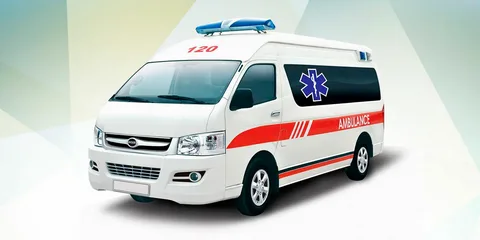When a medical emergency strikes, every second matters. In such critical moments, a dependable and efficient ambulance service can make all the difference between life and death. Whether it’s a road accident, a cardiac arrest, or a sudden health complication, you need an ambulance that arrives quickly, is well-equipped, and is operated by trained professionals.
But with several providers in the market, how do you choose the best ambulance service in your area? In this article, we’ll break down the most important factors to consider, with a special focus on safety standards, urgent response services, and overall reliability.
1. Check Service Availability and Response Time
The very first thing to look at is how quickly the ambulance service can respond to your call. A good ambulance provider should offer:
-
24/7 emergency response
-
Fast arrival times (usually within 10-15 minutes)
-
Live GPS tracking of ambulances
Look for providers who are known for round-the-clock availability, especially during weekends, holidays, or late-night emergencies.
2. Types of Ambulance Services Offered
Different medical situations require different ambulance setups. Ensure the provider offers multiple options, including:
-
Basic Life Support (BLS) ambulances for non-critical patients
-
Advanced Life Support (ALS) ambulances for serious conditions like strokes or heart attacks
-
ICU-equipped ambulances with ventilators, defibrillators, and trained paramedics
-
Air and helicopter ambulances for remote areas or long-distance transfers
-
Neonatal and pediatric ambulances for infants and children
A reliable service provider should be able to match the ambulance type to the patient’s condition without delay.
3. Qualified Medical Personnel Onboard
An ambulance is not just a transport vehicle — it’s a mobile emergency room. The best ambulance services will have:
-
Certified paramedics
-
Trained emergency medical technicians (EMTs)
-
Onboard nurses or doctors when required
Ensure the staff is capable of performing CPR, IV administration, oxygen support, and other lifesaving procedures en route to the hospital.
4. Well-Maintained and Equipped Ambulances
Safety is not just about speed — it’s also about the quality of equipment and the condition of the ambulance. The ideal service should feature:
-
Regularly sanitized and maintained interiors
-
Advanced medical equipment like ECG machines, oxygen tanks, stretchers, suction pumps, etc.
-
Fire extinguishers, first-aid kits, and GPS systems
Vehicles should undergo routine inspections to ensure mechanical reliability and hygiene standards.
5. Reputation and Reviews
Before you finalize a service provider, do some research. Read online reviews on platforms like Google, Facebook, or local business directories. Look for:
-
Consistent positive feedback
-
Praise for punctuality and professionalism
-
Complaints about delay or poor staff behavior
Word-of-mouth recommendations from friends, family, or healthcare professionals can also guide you toward a reputable ambulance company.
6. Clear Pricing and Transparency
Emergency services shouldn’t mean surprise billing. A professional ambulance service will offer:
-
Upfront pricing
-
Detailed cost breakdowns
-
No hidden charges
Ask about pricing for different service types like ICU ambulances or long-distance transport. Some services also accept insurance or offer EMI options for critical transfers.
7. Network with Nearby Hospitals
A great ambulance service is often well-connected with local hospitals. This ensures:
-
Faster hospital admissions
-
Pre-booked emergency room arrangements
-
Seamless transfer from ambulance to hospital staff
This is especially important for patients who require urgent surgeries or emergency care upon arrival.
8. Insurance and Licensing
Always make sure the ambulance provider:
-
Is licensed by the local health authorities
-
Carries liability insurance
-
Complies with healthcare and transport regulations
This not only ensures legality but also guarantees a basic level of service and safety.
9. Emergency Hotline and Support
In stressful emergencies, having access to a calm, trained support team can help. Choose providers who offer:
-
A dedicated 24/7 emergency hotline
-
Real-time assistance during emergencies
-
Multilingual support if needed
Their team should guide you calmly through the steps, from booking to hospital drop-off.
10. Special Services for Urgent Cases
Sometimes you may need more than standard transport, such as:
-
Organ transport ambulances
-
Critical care transfers between hospitals
-
On-site standby ambulances for events
If your area hosts large gatherings, sports events, or high-risk activities, having access to standby ambulances with urgent response readiness is a major plus.
Why Safety Matters in Ambulance Services
Safety is not just about speed; it’s about quality of care, training, and equipment. A poorly managed ambulance can:
-
Delay treatment
-
Lack basic medical gear
-
Be run by undertrained personnel
All these factors put the patient’s life at risk. That’s why every ambulance service you consider should meet strict safety standards, including:
-
Regular sterilization protocols
-
Trained staff for trauma and cardiac response
-
Equipment checklists before each call
-
Secure patient handling techniques
Final Thoughts
Choosing the best ambulance service in your area is not a decision to take lightly. It can literally save a life — yours or that of a loved one. Whether you’re dealing with a one-time emergency or require regular medical transport, always prioritize reliability, safety, urgent service, and qualified medical support.
By following the tips above, you’ll be better prepared to make a confident, informed decision when every second truly counts.
Need a quick checklist? Here’s what to ask your local ambulance service:
-
Are they available 24/7?
-
Do they offer different ambulance types?
-
Are the vehicles equipped with life-saving tools?
-
Are staff medically trained and certified?
-
What is the average response time?
-
Is pricing transparent?
Making the right call today could make all the difference tomorrow.

